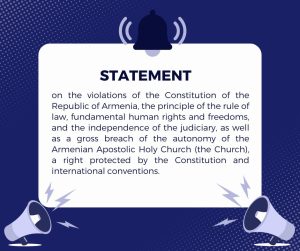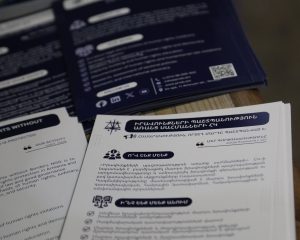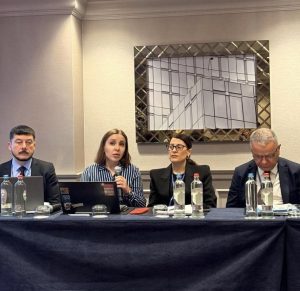Key issues related to the Disciplinary Proceeding of Judges։ Monitoring of proceedings for the period January-June 2023


“Protection of Rights without Borders” non-governmental organization has continued monitoring of proceedings on disciplinary liability of judges by the Supreme Judicial Council with the aim to reveal existing legislative gaps and issues related to the practical implementation. The organization presented the findings in the report on the monitoring of disciplinary proceedings conducted by the Supreme Judicial Council within the period of January-June of 2023.
The study was conducted based on the monitoring of the proceedings examined by the Supreme Judicial Council and analysis of the published decisions on disciplinary liability.
In the reporting period, the Supreme Judicial Council examined 14 cases on disciplinary liability in relation to 17 judges. The overwhelming majority of the proceedings instituted in the reporting period (12 out of 14 cases or 85% of the proceedings) was instituted by the Minister of Justice, the other 2 proceedings – by the Ethics and Disciplinary Commission of the General Assembly of Judges, respectively. In the reporting period, neither the Corruption Prevention Commission nor Supreme Judicial Council Task Force initiated any disciplinary proceedings.
In seven out of 14 cases (50%), disciplinary proceedings were instituted against the judges of the Yerevan Court of General Jurisdiction. In other six cases, disciplinary proceedings were instituted against judges of the Court of General Jurisdiction of Armavir Region, Court of General Jurisdiction of Gegharkunik Region, Court of General Jurisdiction of Lori Region, Court of General Jurisdiction of Syunik Region, Civil Court of Appeal and Civil Chamber of the Court of Cassation, respectively. In one of the cases, the proceedings involved four judges: one held office in the Court of Bankruptcy, the other one – in the Civil Court of Appeal and two judges in the Civil Chamber of the Court of Cassation respectively.
In nine (64%) out of 14 cases the Supreme Judicial Council adopted a decision on subjecting the judges to disciplinary liability. In five cases, the motion on subjecting to disciplinary liability was rejected. In four out of these five cases, the rejection was on the basis was the Article 142 of the Judicial Code finding the violation of being of low importance as the violation does not question the suitability of a judge to their status and by its essence cannot discredit the judiciary.
As for subjecting judges to disciplinary liability, in five cases powers of seven judges were terminated based on the essential disciplinary violation. In one of the cases involving four judges, the powers of three judges were terminated, and the fourth judge filed a resignation letter prior to the adoption of the decision by the Supreme Judicial Council. In two cases, the termination of powers was applied to judges on the ground of expression a public opinion and criticism about the activities of the Supreme Judicial Council, in two other cases – based on the judgments of the European Court of Human Rights finding a violation of human rights, and in one case – based on the violations of the child adoption procedure.
In one case, the Supreme Judicial Council subjected the judges in question to ‘warning’ and in three cases – to ‘reprimand’.
For more information, please visit the link:

On the eve of U.S. Vice President JD Vance’s visit

We, the undersigned civil society organisations and individuals, express our

The Protection of Rights Without Borders team participated in the

On December 4, Hasmik Harutyunyan, Legal Expert at the Protection